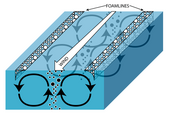Portal:Wetlands
Introduction
A wetland is a land area that is saturated with water, either permanently or seasonally, such that it takes on the characteristics of a distinct ecosystem. The primary factor that distinguishes wetlands from other land forms or water bodies is the characteristic vegetation of aquatic plants, adapted to the unique hydric soil. Wetlands play a number of roles in the environment, principally water purification, flood control, carbon sink and shoreline stability. Wetlands are also considered the most biologically diverse of all ecosystems, serving as home to a wide range of plant and animal life. Wetlands occur naturally on every continent except Antarctica, the largest including the Amazon River basin, the West Siberian Plain, and the Pantanal in South America. The water found in wetlands can be freshwater, brackish, or saltwater. The main wetland types include swamps, marshes, bogs, and fens; and sub-types include mangrove, carr, pocosin, and varzea.
The UN Millennium Ecosystem Assessment determined that environmental degradation is more prominent within wetland systems than any other ecosystem on Earth. International conservation efforts are being used in conjunction with the development of rapid assessment tools to inform people about wetland issues.
Constructed wetlands can be used to treat municipal and industrial wastewater as well as stormwater runoff and they also play a role in water-sensitive urban design.
Selected article
Lake ecosystems are a prime example of lentic ecosystems. Lentic refers to stationary or relatively still water, from the Latin lentus, which means sluggish. Lentic waters range from ponds to lakes to wetlands, and much of this article applies to lentic ecosystems in general. Lentic ecosystems can be compared with lotic ecosystems, which involve flowing terrestrial waters such as rivers and streams. Together, these two fields form the more general study area of freshwater or aquatic ecology.
Lentic systems are diverse, ranging from a small, temporary rainwater pool a few inches deep to Lake Baikal, which has a maximum depth of 1740 m. The general distinction between pools/ponds and lakes is vague, but Brown states that ponds and pools have their entire bottom surfaces exposed to light, while lakes do not. In addition, some lakes become seasonally stratified (discussed in more detail below.) Ponds and pools have two regions: the pelagic open water zone, and the benthic zone, which comprises the bottom and shore regions. Since lakes have deep bottom regions not exposed to light, these systems have an additional zone, the profundal. These three areas can have very different abiotic conditions and, hence, host species that are specifically adapted to live there. (Full article...)
General images
Law
Organizations
- America's Wetland Foundation
- Birds Korea
- Delta Waterfowl Foundation
- Ducks Unlimited
- Foundation for Ecological Security
- Irish Peatland Conservation Council
- National Wetlands Coalition
- Theodore Roosevelt Conservation Partnership
- Union Sportsmen's Alliance
- Wetlands International
- Wildfowl & Wetlands Trust
Topics

- Acrotelm
- Aquatic ecosystem
- Aquatic plants
- Atchafalaya Basin
- Backswamp
- Bayou
- Beach meadow
- Blackwater river
- Blanket bog
- Bog
- Bog bodies
- Bog butter
- Bog garden
- Bog iron
- Bog snorkelling
- Bog-wood
- Brackish marsh
- Callows
- Carr (landform)
- Cataract bog
- Cienega
- Coniferous swamp
- Converted wetland
- Dambo
- Drainage basin
- Drought refuge
- Estuary
- Everglades
- Fen
- Fen-meadow
- Flark
- Flooded grasslands and savannas
- Flood-meadow
- Floodplain
- Freshwater swamp forest
- Grass valley
- Guelta
- Halosere
- High Fens
- High marsh
- Hamuns
- Hydric soil
- Hydrology
- Hydrosere
- Igapó
- Ings
- Integrated constructed wetland
- Interdunal wetland
- Intertidal wetland
- Kettle (landform)
- Lagoon
- Lake ecosystem
- Limnology
- List of bogs
- List of fen plants
- Low marsh
- Meadowview Biological Research Station
- Marsh
- Marsh gas
- Mere
- Mire
- Misse
- Moorland
- Muck
- Mudflat
- Muskeg
- Myristica swamp
- Oasis
- Ombrotrophic
- Paludification
- Palustrine wetland
- Pantanal
- Peat
- Peat swamp forest
- Pond
- Pothole
- Prairie Pothole Region
- Ramsar site
- Reed bed
- Restoration of the Everglades
- Riparian zone
- River delta
- River ecosystem
- Salt marsh
- Salt marsh dieback
- Salt marsh die-off
- Salt pannes and pools
- Shrub swamp
- Slough (hydrology)
- Sphagnum
- String bog
- Sudd
- Swale
- Swamp
- Tropical peat
- Várzea forest
- Vernal pool
- Water stagnation
- Wetland classification
- Wetland conservation
- Wetland indicator status
- Wetland methane emissions
- Wetlands International
- Wetlands
- Wildfowl & Wetlands Trust
- Will-o'-the-wisp
- Yaéré
Things you can do
- Create articles: There are many articles that have yet to be started... Pick your favorite and start researching!
- Find photos for articles: Many wetlands–related articles would be substantially better with the addition of one or more photographs. Feel free to take your own and upload them, or find ones with the appropriate licenses and upload them here!
- Categorize articles: Figure out what categories to add to each article so that others can find them more easily.
- Expand articles: There are many wetland stubs which could use extensive updates and development.
- Find sources: Many of our articles are poorly sourced and could use much better citations.
- Wikify: Add {{Portal|Wetlands}} to the See also sections of Wetlands-related articles.
WikiProjects
Wikimedia
The following Wikimedia Foundation sister projects provide more on this subject:
-
Commons
Free media repository -
Wikibooks
Free textbooks and manuals -
Wikidata
Free knowledge base -
Wikinews
Free-content news -
Wikiquote
Collection of quotations -
Wikisource
Free-content library -
Wikispecies
Directory of species -
Wikiversity
Free learning tools -
Wikivoyage
Free travel guide -
Wiktionary
Dictionary and thesaurus












































































